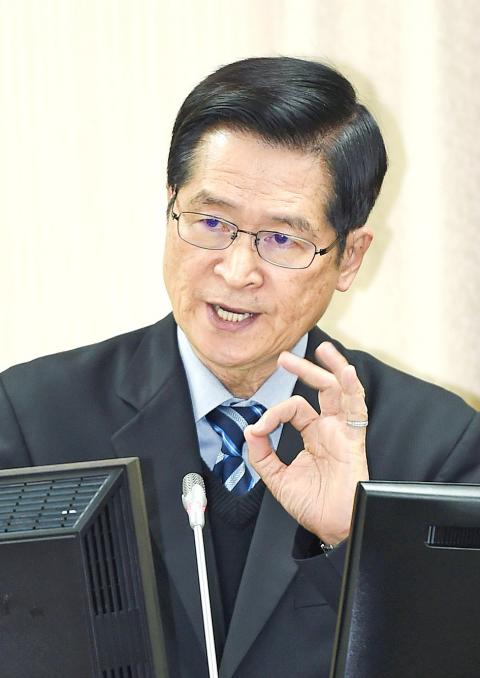The nation’s armed forces can hold the line against China’s People’s Liberation Army (PLA), Minister of National Defense Yen De-fa (嚴德發) yesterday told the Legislative Yuan’s Foreign Affairs and National Defense Committee.
During a question-and-answer session, Yen was asked to evaluate the comparative military capabilities of Taiwan and China, three days after President Tsai Ing-wen (蔡英文) told CNN that Taiwan was “capable of holding off any first waves of attacks” by China.
Democratic Progressive Party (DPP) Legislator Lo Chih-cheng (羅致政) asked what the military’s capabilities were to respond to a PLA “first strike,” and whether it had the ability to mount a pre-emptive strike against China.

Photo: Fang Pin-chao, Taipei Times
The nation’s two-staged military doctrine is to enact force protection, followed by the deployment of combat power, Yen told Lo.
“For force protection, we must be capable of absorbing the first strike, so critical and dependable forces are mechanized, and they will not stay still for the enemy to hit,” he said. “For deploying combat power, we will use counterattacks and early suppression of the enemy, as well as other actions.”
“As for pre-emptive capabilities, we possess them, but we are not at liberty to discuss them,” he said.
However, he added that those capabilities are for creating a multi-layered deterrence, not for launching first strikes.
When DPP Legislator Wu Kun-yuh (吳焜裕) asked Yen to elaborate on the national military doctrine, the minister said Taiwan was not engaged in an arms race with China and the military relies on quality to overcome quantity.
To augment force protection, the ministry is working with local governments to mobilize assets necessary to protect military installations against Chinese guided missiles, in conjunction with concealment and mobility measures, he said.
The armed forces would deploy mobile and decisive weapons systems to fight at the place and time of its choosing, with an emphasis on using the terrain to maximize asymmetric warfare capabilities in the counter-air, counter-naval and counter-amphibious operational phases of such a war, Yen said.
Chinese Nationalist Party (KMT) Legislator William Tseng (曾銘宗) asked Yen to gauge the time the military could hold out against the PLA, and what the armed forces would do if war broke out as the result of political conflict between independence and unification factions.
While the military does not quantify defensive time frames for doctrinal reasons, “we have full confidence and capability to stay on top of regional developments and defend our homeland,” Yen said.
The military’s core value is its constitutional duty to defend the Republic of China and the citizens residing within its domain, he said.
The US is certain to intervene if regional security developments threaten its national interests and Japan could possibly be involved, he said, adding that the ministry could not speak for the intentions of the Philippines.

Taiwan is projected to lose a working-age population of about 6.67 million people in two waves of retirement in the coming years, as the nation confronts accelerating demographic decline and a shortage of younger workers to take their place, the Ministry of the Interior said. Taiwan experienced its largest baby boom between 1958 and 1966, when the population grew by 3.78 million, followed by a second surge of 2.89 million between 1976 and 1982, ministry data showed. In 2023, the first of those baby boom generations — those born in the late 1950s and early 1960s — began to enter retirement, triggering

ECONOMIC BOOST: Should the more than 23 million people eligible for the NT$10,000 handouts spend them the same way as in 2023, GDP could rise 0.5 percent, an official said Universal cash handouts of NT$10,000 (US$330) are to be disbursed late next month at the earliest — including to permanent residents and foreign residents married to Taiwanese — pending legislative approval, the Ministry of Finance said yesterday. The Executive Yuan yesterday approved the Special Act for Strengthening Economic, Social and National Security Resilience in Response to International Circumstances (因應國際情勢強化經濟社會及民生國安韌性特別條例). The NT$550 billion special budget includes NT$236 billion for the cash handouts, plus an additional NT$20 billion set aside as reserve funds, expected to be used to support industries. Handouts might begin one month after the bill is promulgated and would be completed within

NO CHANGE: The TRA makes clear that the US does not consider the status of Taiwan to have been determined by WWII-era documents, a former AIT deputy director said The American Institute in Taiwan’s (AIT) comments that World War-II era documents do not determine Taiwan’s political status accurately conveyed the US’ stance, the US Department of State said. An AIT spokesperson on Saturday said that a Chinese official mischaracterized World War II-era documents as stating that Taiwan was ceded to the China. The remarks from the US’ de facto embassy in Taiwan drew criticism from the Ma Ying-jeou Foundation, whose director said the comments put Taiwan in danger. The Chinese-language United Daily News yesterday reported that a US State Department spokesperson confirmed the AIT’s position. They added that the US would continue to

IMPORTANT BACKER: China seeks to expel US influence from the Indo-Pacific region and supplant Washington as the global leader, MAC Minister Chiu Chui-cheng said China is preparing for war to seize Taiwan, Mainland Affairs Council (MAC) Minister Chiu Chui-cheng (邱垂正) said in Washington on Friday, warning that Taiwan’s fall would trigger a regional “domino effect” endangering US security. In a speech titled “Maintaining the Peaceful and Stable Status Quo Across the Taiwan Strait is in Line with the Shared Interests of Taiwan and the United States,” Chiu said Taiwan’s strategic importance is “closely tied” to US interests. Geopolitically, Taiwan sits in a “core position” in the first island chain — an arc stretching from Japan, through Taiwan and the Philippines, to Borneo, which is shared by